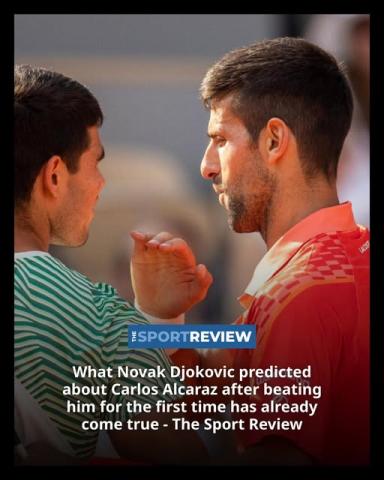
There is a unique moment in the career of every all-time great, a subtle but seismic shift they feel before anyone else. It’s not in the roar of a championship point or the glare of a final. It’s in the quiet, often in practice, or in the early rounds of a tournament, when a new force arrives. It’s the moment a king identifies the heir.
For Novak Djokovic, a man who has built a fortress at the top of men’s tennis by dismantling the games of legends and challengers alike, that moment of clarity came not with a trophy in his hands, but with a keen, analytical eye on a young Spaniard named Carlos Alcaraz.
Long before their epic Wimbledon final in 2023—a match already etched in history as a symbolic passing of the torch—Djokovic knew. He saw what others were only beginning to suspect: Carlos Alcaraz was not just a promising talent; he was something special, a complete anomaly.
The clues were there for those who knew how to read them. It wasn't just the explosive power, the fearless shot-making, or the dizzying speed—the tour is littered with athletic phenoms. What Djokovic, the ultimate student of the game, recognized was the synthesis.
He saw the mind of a veteran in the body of a teenager. In Alcaraz, Djokovic recognized a rare and precious trait: a tactical maturity that defied his age. This was a player who could construct points with the guile of a clay-court specialist, unleash a 100-mph forehand winner on the run, and then finish it all with a feather-soft drop shot that would make a artist proud. It was this complete, unpredictable arsenal that signaled to Djokovic that this was a different kind of challenge.
In interviews, even after beating a younger Alcaraz, Djokovic’s praise was always pointed, specific, and layered with respect. He didn’t just compliment his "power" or "speed." He highlighted his "mental resilience," his "ability to learn and adapt mid-match," and his "complete game." These are the observations of a peer, not a patronizing elder. Djokovic was essentially describing the very qualities that defined his own rise.
This knowing is more than just a compliment; it’s a catalyst. For a champion like Djokovic, the sight of a true rival doesn’t signal an end—it reignites the fire. It provides a new mountain to climb, a new puzzle to solve. The knowledge that a player like Alcaraz was coming forced an evolution. It demanded a renewed commitment to physical conditioning, a deeper analysis of his own game, and a sharpening of his legendary mental edge. The hunter, once again, had to avoid becoming the hunted.
The greats of any sport possess a radar for genuine threat. They’ve dismissed countless "next big things" whose games had a fatal flaw—a weak backhand, a fragile mentality, a one-dimensional plan. But when they see the real deal, their demeanor changes. The respect is genuine, the analysis is deeper, and the preparation becomes paramount.
When Djokovic looked at Carlos Alcaraz, he didn't just see a flashy new player. He saw a reflection of his own relentless ambition. He saw a game built for all surfaces. He saw a heart that beat for the biggest points on the biggest stages. He saw, in essence, the first player of the next generation who could truly and consistently look him in the eye.
That knowing glance from a legend is the ultimate validation. It’s the silent admission that the future has arrived, and it’s here to stay. For Alcaraz, earning that look from Djokovic was a milestone as significant as any first title. It meant he had passed the most difficult test of all: the test from the throne itself.
